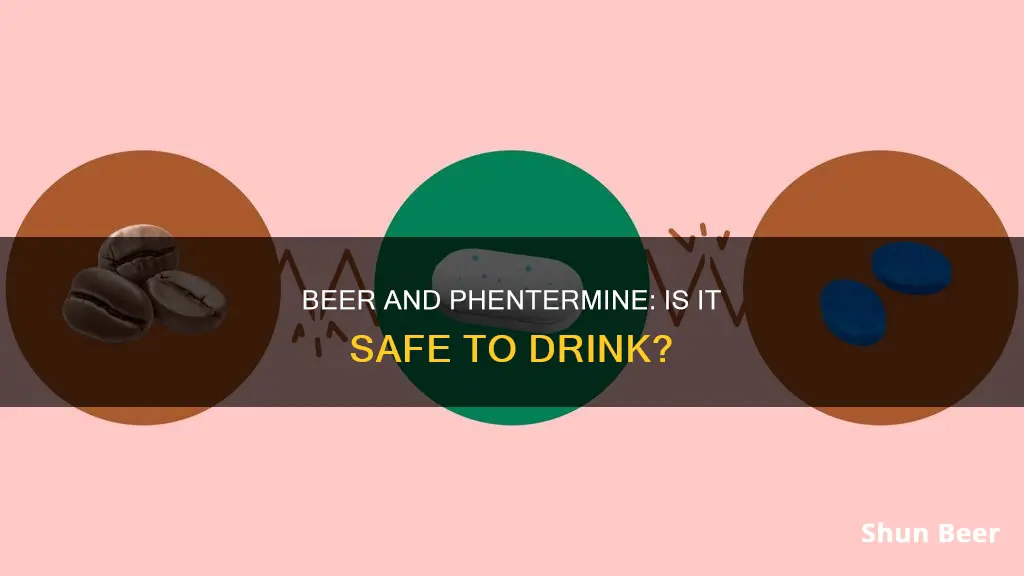
Phentermine is a prescription weight loss drug that is often recommended to people whose obesity is affecting their health. It is typically prescribed for short-term use and should be taken under the guidance of a healthcare provider. While phentermine is considered safe and effective, there are several risks and side effects associated with its use, including increased heart rate and blood pressure. One of the most significant risks is combining phentermine with alcohol, as it can lead to adverse reactions and severe side effects. Alcohol is a depressant that affects the central nervous system, while phentermine is a stimulant that suppresses appetite. Combining these two substances can have serious implications for the body, including enhanced side effects, impaired judgment, and coordination, and increased risk of cardiovascular complications. It is generally recommended to avoid consuming alcohol while taking phentermine to ensure optimal safety and treatment effectiveness.
| Characteristics | Values |
|---|---|
| Mixing phentermine and alcohol | Can increase the risk of severe side effects |
| Can increase the risk of cardiovascular issues | |
| Can lead to enhanced and potentially dangerous side effects, such as dizziness, headache, and increased heart rate | |
| May cause gastrointestinal issues | |
| May alter your mood and mental state | |
| May cause nervous system side effects such as dizziness, drowsiness, depression, and difficulty concentrating | |
| May increase the risk of developing psychological dependence | |
| May lead to memory loss and impaired recall | |
| May cause liver dysfunction | |
| May increase the risk of overdose |
What You'll Learn

Cardiovascular issues
Phentermine is a prescription weight-loss drug that suppresses appetite and is typically prescribed for short-term use. It is similar in composition to amphetamines and stimulates the central nervous system.
Phentermine is known to have several cardiovascular side effects, especially when combined with alcohol. The combination can increase the risk of cardiovascular issues such as:
- Increased heart rate
- Chest pain
- Abnormal increases in blood pressure
- Heart failure (for those with underlying conditions such as heart disease)
- Stroke
- Myocardial infarction
- Syncope
- Arrhythmias
Phentermine is not recommended for those with a history of cardiovascular issues, including:
- Congestive heart failure
- Coronary artery disease
- Stroke
- Arrhythmias
- Uncontrolled hypertension
- Cardiomyopathy
- Coronary artery disease
- Other serious cardiac disease
Additionally, phentermine may cause pulmonary hypertension, a rare but often fatal condition.
Drinking 10 Beers: Is It Possible?
You may want to see also

Central nervous system problems
Phentermine is a prescription weight loss drug that has central nervous system (CNS) stimulant effects and helps reduce feelings of hunger. It is chemically similar to amphetamine and is classified as a Schedule IV controlled substance with a small risk of abuse and dependence.
Alcohol, on the other hand, is a depressant that acts on the central nervous system by slowing down the communication between nerve cells in the brain.
Combining phentermine and alcohol can lead to adverse effects and compromise the intended purpose of the medication. The interaction between the two substances can cause serious central nervous system problems, including:
- Dizziness: Both phentermine and alcohol can cause dizziness, and the effect may be intensified when the substances are combined. This can impair daily activities and increase the risk of accidents or injuries.
- Drowsiness: Phentermine and alcohol can both induce drowsiness, and their simultaneous use may result in extreme sleepiness. This can impact an individual's ability to perform daily tasks and increase the risk of accidents.
- Difficulty concentrating: The use of phentermine and alcohol together can make it challenging for individuals to focus and concentrate. This can affect their ability to perform tasks requiring mental alertness, such as driving or operating machinery.
- Impaired judgment: Alcohol is known to impair judgment, and when combined with phentermine, this effect may be heightened. This can lead to poor decision-making and risky behaviours.
- Memory loss and impaired recall: Alcohol consumption can impact memory and cognitive functioning. Mixing it with phentermine may further increase the risk of memory loss and impair an individual's ability to recall information. These effects can have long-term consequences on cognitive abilities.
It is crucial to avoid or limit alcohol consumption while taking phentermine to minimise the risk of central nervous system problems and other potential side effects. Consulting with a healthcare provider is highly recommended to ensure optimal treatment and safety.
Beer and Teeth Whitening: What You Need to Know
You may want to see also

Psychological effects
Phentermine is a prescription weight loss drug that is chemically similar to the stimulant drug amphetamine. It is typically prescribed for short-term use to help individuals with obesity or those who are overweight with weight-related conditions. While phentermine can aid in weight loss efforts, it is not without its risks and side effects.
When it comes to combining phentermine and alcohol, there are several psychological effects and risks that individuals should be aware of. Here are some key psychological effects to consider:
- Addiction and Dependence: Both phentermine and alcohol can be addictive. Mixing the two substances may increase the risk of developing a psychological dependence on either or both substances. This can lead to a cycle of dependence, making it challenging for individuals to stop using them.
- Withdrawal Symptoms: Stopping the use of phentermine or alcohol can result in unpleasant withdrawal symptoms. The risk of experiencing withdrawal symptoms may be heightened when both substances are used together.
- Mental Health Issues: Prolonged use of phentermine may lead to the development of mental illnesses. Mixing phentermine with alcohol can further compromise an individual's mental state and increase the risk of experiencing mood changes, confusion, anxiety, and panic.
- Compromised Judgment and Decision-Making: Alcohol is a depressant that affects the central nervous system, impairing judgment and leading to poor decision-making and risky behaviours. Combining phentermine with alcohol may exacerbate these effects, making individuals more susceptible to making impulsive or dangerous choices.
- Memory Loss and Impaired Recall: Alcohol consumption can negatively impact memory and cognitive functioning. Mixing phentermine with alcohol may increase the risk of experiencing memory loss and impaired recall, with potential long-term consequences on cognitive abilities.
- Enhanced Side Effects: Phentermine may cause side effects such as dizziness, drowsiness, and difficulty concentrating. Alcohol can produce similar effects on the central nervous system. When combined, the risk of experiencing heightened and overlapping side effects increases, impacting daily activities and increasing the risk of accidents or injuries.
Beer on the Chicago Metra: What's the Rule?
You may want to see also

Liver function and metabolism
Phentermine and alcohol are both metabolized by the liver. The liver plays a crucial role in metabolizing medications and removing toxins from the body. When an individual consumes both substances, the liver has to process them simultaneously, which may compromise its function. This additional strain on the liver can potentially lead to negative effects on liver health.
The liver is responsible for breaking down medications and toxins, and when it is burdened with processing multiple substances at the same time, its ability to function optimally may be compromised. This can result in a build-up of toxins in the body and impact the effectiveness of the medication.
Phentermine is a prescription weight loss medication that is often recommended for individuals with obesity-related health issues. It is designed for short-term use and should be taken under the guidance of a healthcare provider. Alcohol, on the other hand, is a central nervous system depressant that is widely consumed for its relaxing and sedative effects. It acts by slowing down the communication between nerve cells in the brain.
When phentermine and alcohol are combined, there is an increased risk of adverse effects and a compromise of the intended purpose of the medication. The simultaneous consumption of these substances can lead to a range of side effects, including gastrointestinal problems, cardiovascular issues, and central nervous system complications.
It is important to note that the combination of phentermine and alcohol can also impact liver function and metabolism. Therefore, individuals taking phentermine are advised to avoid alcohol consumption to ensure optimal safety and treatment effectiveness. Consulting with a healthcare provider is crucial to assess potential risks and receive personalized advice regarding alcohol consumption while taking phentermine.
Moderate Beer Drinking: Safe for Type 2 Diabetics?
You may want to see also

Alcohol inhibiting weight loss
Drinking alcohol while taking phentermine is not recommended due to the risk of severe side effects, including cardiovascular issues such as increased heart rate and abnormal blood pressure. Even a small amount of alcohol can interact with phentermine and cause adverse reactions. Therefore, it is generally advised to avoid alcohol entirely while taking this medication.
Alcohol can inhibit weight loss in several ways:
High Calorie Content
Alcohol is high in calories, with seven calories per gram, almost twice as many as protein and carbohydrates, and only two fewer than fat. Alcoholic drinks also contain additional calories from other sources, such as carbohydrates, fats, and sugars used as mixers. These extra calories can contribute to weight gain and hinder weight loss efforts.
Empty Calories
The calories from alcohol are often referred to as "empty calories" because they provide energy without any nutritional value. This means that drinking alcohol does not help the body meet its nutritional needs, and can disrupt the absorption of essential nutrients from other sources.
Increased Appetite
Alcohol can stimulate appetite and increase cravings for fatty, salty, and unhealthy foods. It can also affect motivation, making it harder to stick to a healthy diet. This can lead to excess fat gain and hinder weight loss.
Interference with Fat Burning
Alcohol interferes with the body's fat-burning mechanisms. When alcohol is consumed, the body prioritizes breaking down alcohol for energy instead of burning fat. This postpones the fat-burning process and contributes to greater fat storage.
Negative Health Effects
Alcohol can damage the stomach, kidneys, and liver, leading to serious health problems and interfering with a healthy metabolism. It can also lower testosterone levels, which reduces its fat-burning potential and contributes to decreased muscle mass and a lowered metabolic rate.
Beer Before Workout: Good or Bad Idea?
You may want to see also
Frequently asked questions
No, it is not recommended to drink alcohol while taking phentermine due to the risk of cardiovascular side effects, such as an increased heart rate or irregular heartbeat.
Mixing phentermine and alcohol can increase the risk of severe side effects, including cardiovascular issues, gastrointestinal problems, and central nervous system complications.
The combination of phentermine and alcohol can lead to various side effects, including dizziness, drowsiness, impaired coordination, memory loss, and difficulty concentrating.
It is generally recommended to wait at least a few days, as phentermine can stay in your system for up to 72 hours. However, it is best to consult with a healthcare professional for personalized advice.
Combining phentermine and alcohol can lead to adverse effects, compromise the intended purpose of the medication, and increase the risk of developing a psychological dependence on either substance.







